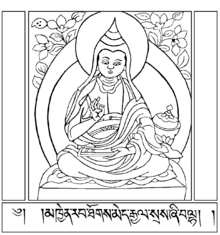Our website is made possible by displaying online advertisements to our visitors.
Please consider supporting us by disabling your ad blocker.
Shantideva
Śāntideva | |
|---|---|
 Tibetan depiction of Shantideva | |
| Personal life | |
| Born | c. 685 CE |
| Died | c. 763 CE |
| Education | |
| Religious life | |
| Religion | Buddhism |
| School | |
Shantideva (Sanskrit: Śāntideva; Chinese: 寂天; Tibetan: ཞི་བ་ལྷ།, THL: Zhiwa Lha; Mongolian: Шантидэва гэгээн; Vietnamese: Tịch Thiên) was an 8th-century CE Indian philosopher, Buddhist monk, poet, and scholar at the mahavihara of Nalanda. He was an adherent of the Mādhyamaka philosophy of Nāgārjuna. Abhayadatta Sri also lists Shantideva as one of the eighty-four mahasiddhas and is known as Bhusuku Pa (布苏固巴).[1]
Two works of Shantideva are extant, the Bodhisattvacaryāvatāra and the Śikṣāsamuccaya, both of which were written with the intention of being training manuals for one who intends to follow the path of the bodhisattva. The Bodhisattvacaryāvatāra in particular was the subject of both Indian and Tibetan commentaries during the period it was written and has also received large amounts of attention from both academics and lay practitioners in recent years as well including a commentary written by the 14th Dalai Lama.[2]
- ^ Donald S. Lopez Jr. (28 May 2019). Seeing the Sacred in Samsara: An Illustrated Guide to the Eighty-Four Mahasiddhas. Shambhala. p. 125. ISBN 978-0-8348-4212-0.
- ^ Edelglass, William (2022). The Routledge Handbook of Indian Buddhist Philosophy. Taylor and Francis. pp. 511–525. ISBN 978-1-351-03088-5.
Previous Page Next Page


